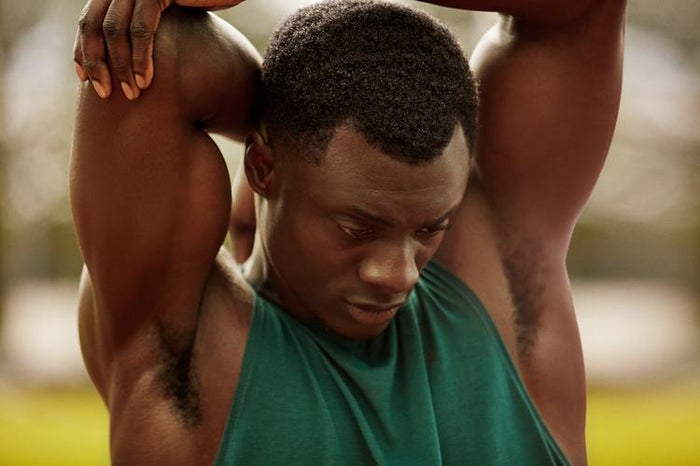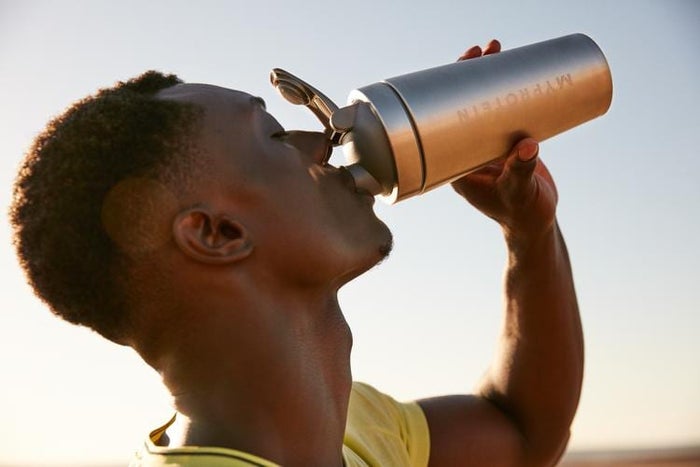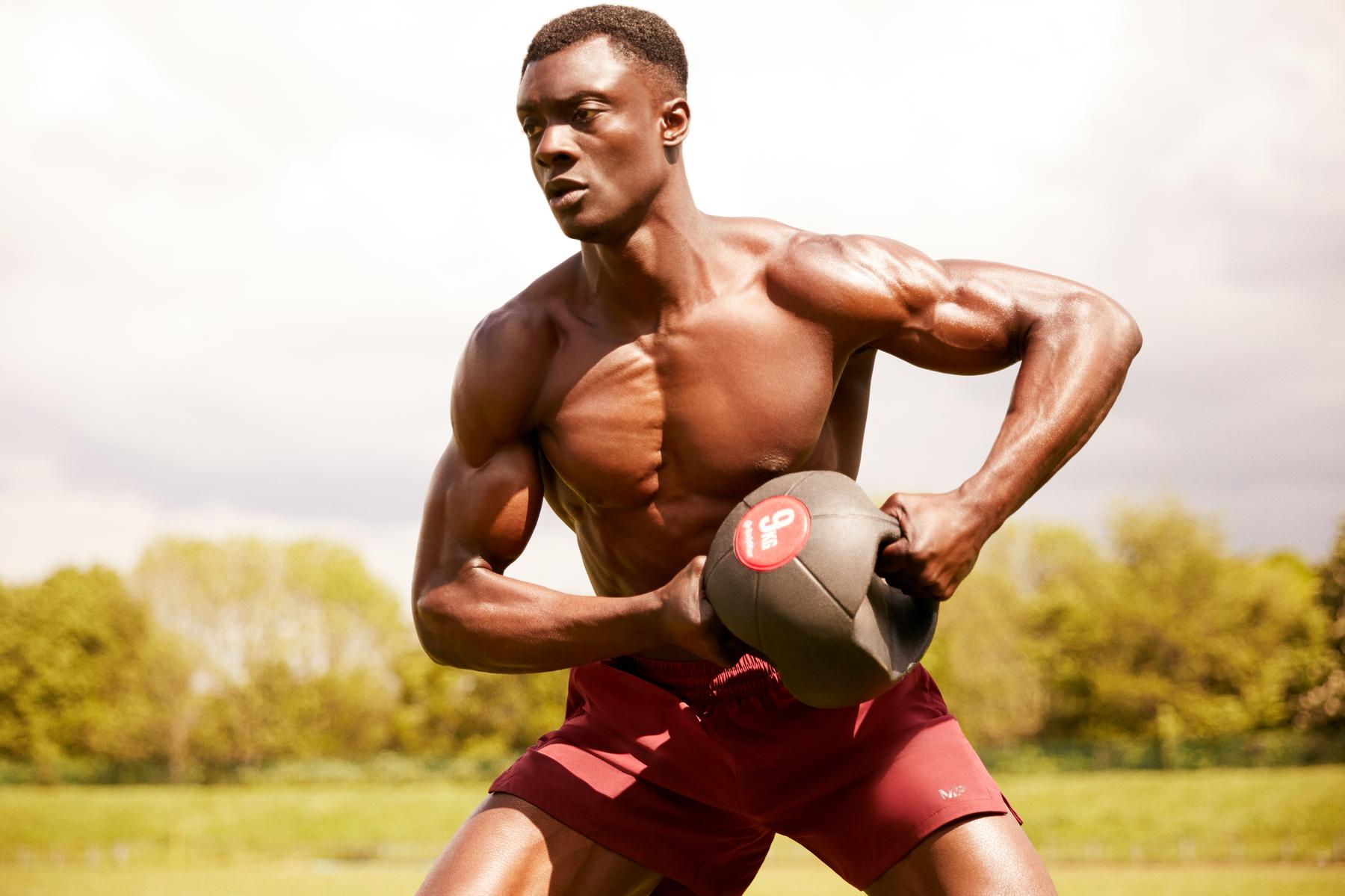- Tipton, K. D., Ferrando, A. A., Phillips, S. M., et al. (1999). Postexercise net protein synthesis in human muscle from orally administered amino acids. American Journal of Physiology, 276(4), 628-634. doi.org/10.1152/ajpendo.1999.276.4.E628
- Ananieva, E.A., Powell, J.D., Hutson, S.M., (2016). Leucine Metabolism in T Cell Activation: mTOR Signaling and Beyond. Advances in Nutrition, 7(4), pp. 798-805. doi:10.3945/an.115.011221
- Elango, R., Ball, R. O. & Pencharz, P. B. (2014). Tolerability of Leucine in Humans. Branched Chain Amino Acids in Clinical Nutrition, 3-13. doi.org/10.1007/978-1-4939-1914-7_1
- Areta, J. L. & Hopkins, W. G. (2018). Skeletal Muscle Glycogen Content at Rest and During Endurance Exercise in Humans: A Meta-Analysis. Sports Medicine, 48(9), 2091-2102. doi.org/10.1007/s40279-018-0941-1
- Areta, J. L., Burke, L. M., Ross, M. R., et al. (2013). Timing and distribution of protein ingestion during prolonged recovery from resistance exercise alters myofibrillar protein synthesis. The Journal of Physiology, 591(9), 2319-2331. doi.org/10.1113/jphysiol.2012.244897
- Escobar, K. A., VanDusseldorp, T. A. & Kerksick, C. M. (2016). Carbohydrate intake and resistance-based exercise: are current recommendations reflective of actual need? British Journal of Nutrition, 116(1228), 2053-2065. doi.org/10.1017/S0007114516003949
- Bishop, P. A., Jones, E. & Woods, A. K. (2008). Recovery From Training: A Brief Review: Brief Review. Journal of Strength and Conditioning Research, 22(3), 1015-1024. doi: 10.1519/JSC.0b013e31816eb518
- McLester, J. R., Bishop, P. A., Smith, J., et al. (2003). A Series of Studies-A Practical Protocol for Testing Muscular Endurance Recovery. Journal of Strength and Conditioning Research, 17(2), 259-273.
- Aragon, A. A. & Schoenfeld, B. J. (2013). Nutrient timing revisited: is there a post-exercise anabolic window? Journal of the International Society of Sports Nutrition,10(5). doi: 10.1186/1550-2783-10-5
- Fullagar, H. H. K., Skorski, S., Duffield, R., et al. (2015). Sleep and Athletic Performance: The Effects of Sleep Loss on Exercise Performance, and Physiological and Cognitive Responses to Exercise. Sports Medicine, 45(2), 161-186. doi.org/10.1007/s40279-014-0260-0
- Sassin, J. F., Parker, D. C., Mace, J. W., et al. (1969). Human growth hormone release: relation to slow-wave sleep and sleep-walking cycles. Science, 165(3892), 513-515. doi: 10.1126/science.165.3892.513

Весна, лето, осень и сезон массонабора - звучит привычно, не правда ли? Что ж, по крайней мере, это так для многих любителей фитнеса, которые собираются в течение следующих нескольких месяцев набирать массу.
Как правило, все люди любят еду, поэтому большинство должно считать, что «съедать чертовски много еды» - это довольно приятно. К тому же, если вы увеличите количество потребляемых калорий, не усердствуя при этом в кардио, вы наберете вес. Однако так ли это легко на самом деле? В этой статье мы хотим дать вам несколько советов о том, как правильно набирать массу, то есть как максимально увеличить мышечную массу, набрав при этом минимум жировой массы. Так что, если вы думали, что в вашем меню в период массонабора будут пицца, чипсы и мороженое - вам нужно переосмыслить весь процесс.
1. Заправьте топливом свою тренировку
Итак, представьте что вы сели в машину и готовы отправиться в прекрасное путешествие. Скажем, вы собираетесь в недалекое путешествие, ваш пункт назначения буквально за углом, и чтобы добраться туда, вам понадобится совсем немного топлива. А что если вы собрались объездить всю страну? Тогда вам понадобится полный бак топлива. А если вы забудете заправиться, в конечном итоге вам придется выйти из машины и отменить все свои планы.
Наверняка вы догадались, к чему мы клоним: вы — это автомобиль, топливо — это еда, а путешествие — ваша тренировка. Но как же нужно заправляться в период массонабора?
Что кушать, чтобы быстро набрать массу?
Как мы уже говорили, если вы набираете массу, это не значит, что вам нужно употреблять нездоровую пищу в больших количествах. Если хотите набрать сухую массу, вам необходимо потреблять продукты, являющиеся высококачественными источниками белка, такие как курица, рыба, яйца и йогурт без добавленных вкусов. Они богаты незаменимыми аминокислотами, которые необходимы для создания новых мышечных белков.1
Наиболее важной для наращивания мышечной массы аминокислотой считается лейцин. Это аминокислота с разветвленной цепью, лучший стимулятор метаболического пути, ведущего к производству новых мышечных белков. По сути, она выполняет роль «включателя».2 В день на килограмм массы тела рекомендуется потреблять 50 мг лейцина. Этого можно добиться с помощью диеты (хорошие источники — куриное мясо, тунец и тофу) или потребляя специальные препараты. К слову, сывороточный протеин имеет самое высокое содержание лейцина.3
Чтобы правильно восстановиться после тренировки, вам также необходимо большое количество углеводов. Углеводы в основном хранятся в организме в виде мышечного гликогена и являются основным источником энергии, затрачиваемой во время выполнения упражнений. После тренировки необходимо восполнить запасы гликогена в мышцах, чтобы подготовить себя к следующему занятию — поэтому нужно включить в рацион углеводы.4 Эти продукты — хороший выбор:
Макаронные изделия из цельной пшеницы
Рис
Картошка и батат
Цельнозерновой хлеб
Овсяные хлопья
Фрукты
Жир является наиболее калорийным макроэлементом — в одном грамме жира содержится девять калорий. Это более чем в два раза превышает калорийность белков и углеводов. Таким образом, увеличение потребления жиров — простой способ получения дополнительных калорий и обеспечения себя избыточной энергией. Однако учтите, что здесь легко недосмотреть и получить из жиров слишком большое количество калорий, поэтому ключевым является контролирование размеров порции. Выбирайте «полезные жиры» (моно- и полиненасыщенные), которые содержатся в следующих продуктах:
Орехи и ореховые пасты
Семена
Авокадо
Масла
Молочные продукты
При этом не пренебрегайте питательными веществами — витамины и микроэлементы необходимы для поддержания здоровья, поэтому обязательно ешьте разнообразные фрукты и овощи.
Когда принимать пищу, если хочешь набрать массу?
Чтобы набрать массу и увеличить сухую мышечную массу, вам необходимо находиться в состоянии положительного азотистого баланса, при котором рост мышц превышает их разрушение. Для создания положительного азотистого баланса старайтесь каждые 3-4 часа есть немного белка (около 20 г). Основное время приема белка — это завтрак, после тренировки и перед сном.5 Вы можете распределить прием белка на три приема пищи или перекусывать белковыми закусками и коктейлями между основными приемами пищи.
Как мы уже говорили, углеводы являются основным источником энергии, который используется в повседневной жизни и во время выполнения упражнений, поэтому в идеале вы должны потреблять углеводы в течение всего дня. Учитывая что углеводы, восполняя запасы гликогена в мышцах, играют ключевую роль в восстановлении, важно получить некоторое количество углеводов после тренировки.4 Это можно сделать легко — выпейте стакан молока или, что еще лучше, добавьте молоко к белковому порошку и взбейте белково-углеводный коктейль — вы получите два важных макроэлемента в одном напитке.
И все же, разумно подходите к потреблению углеводов: рассчитывайте порции в зависимости от количества проведенных тренировок. В день отдыха вам не нужно столько углеводов (или общего количества калорий), сколько в день тяжелых тренировок. В качестве отправного пункта можете исходить из следующей дозировки: в дни отдыха или легких тренировок принимайте приблизительно три грамма углеводов на килограмм массы тела (к примеру, если вы весите 80 кг, то вам нужно примерно 240 г). Увеличивайте эту дозу в соответствии с интенсивностью и требованиями вашей тренировки.6
Отслеживайте свой прогресс и следите за тем, как ваше тело реагирует на принимаемую пищу. Помните, что набор массы тела — это не гонка.
Как набрать массу с помощью дополнительных препаратов
Прием дополнительных препаратов не обязателен при наборе массы, однако некоторые из них могут значительно облегчить сам процесс. Они удобны, когда вы в пути, а если у вас нет времени на готовку, они с легкостью покроют потребность во всех необходимых для организма веществах. Когда наступает сезон массонабора, то стоит попробовать эти продукты, лучшие в своей области:
Протеиновые порошки - казеин, сывороточный, соевый, гороховый и др.
Протеиновые батончики
Креатин
Лейцин
Гейнеры (смеси углеводов и белков)
Кофеин — для бодрости перед тренировкой

2. Подберите правильные тренировки
Теперь, когда вы освоили диету, поговорим о тренировках? Хорошо комбинировать разные тренировки, чтобы тело не привыкало к одним и тем же движениям. Если изменить вид, интенсивность или продолжительность упражнений, и тем самым дать мышцам новый стимул, он заставит их адаптироваться, развиваться и расти.
Знаете то чувство, когда вы тренируете мышцу, о которой забыли, а на следующий день ощущаете сильное чувство жжения? Что же, вероятно, в следующий раз, когда вы будете тренировать эту мышцу, она уже не будет так сильно болеть. Это связано с «тренировочной адаптацией», которая является важным процессом в период массонабора.
Учитывая вышесказанное, приводим список нескольких упражнений, которые помогут вам набрать массу. Не забудьте комбинировать их:
Сложные тяги (приседания, становая тяга, жим лежа)
Упражнения на сопротивление
Ритмическая гимнастика (подтягивания, отжимания, отжимания на трицепс и т. д.)
HIIT (высокоинтенсивная интервальная тренировка)
Аэробные кардиотренировки
Да, вы не ослышались. Кардиоупражнения очень важны для поддержания здоровья сердечно-сосудистой системы и общей физической формы, поэтому, даже если вы набираете массу, вам следует проводить несколько таких тренировок в неделю. Однако не нужно слишком увлекаться — кардио может сжечь много калорий, поэтому убедитесь, что питаетесь достаточно калорийно.
3. Восстанавливайтесь правильно
Вы можете подумать, что чем больше будете тренироваться, тем больше накачаете мышц. Однако это большое заблуждение. На самом деле, перетренировка или невозможность восстановиться должным образом после тренировки, может помешать процессу набора массы.
Когда вы занимаетесь силовыми тренировками, ваши мышечные волокна повреждаются — они растягиваются, рвутся и разрушаются. Ваши мышцы начинают расти, становясь больше и сильнее, именно в процессе восстановления, поэтому ключевым элементом успешного набора массы является послетренировочное восстановление.7
У многих из нас увеличение массы ассоциируется с поднятием более тяжелых весов или выполнением большего количества повторений. В целом, с проведением более сложных тренировок, которые заставят мышцы расти. Что ж, учтите, что помешать вам в этом может недостаточное восстановление.
Во время исследования, проведенного среди мужчин, тренирующихся с отягощениями, после всего лишь двадцати четырех часов восстановления ни один из них не смог выполнить свои 10 RM (максимальный вес, поднятый за 10 повторений) в 8 упражнениях. Даже после четырех дней отдыха только 80% участников смогли набрать свои 10 RM.8
Перед тем как тренировать ту же самую группу мышц, дайте себе несколько дней отдыха, чтобы воспользоваться всеми преимуществами тренировки для наращивания мышц. Кроме того, полностью не восстановившись, вы подвергаете себя большему риску травмы, поэтому не торопитесь быстро выполнять слишком большую нагрузку.
И конечно, не забывайте о питании. Углеводы должны вернуться в мышцы в течение 30 минут после тренировки. Что касается протеина, времени у вас чуть больше. Чтобы ваши мышцы снова начали расти, лучшее время для приема протеина — через два часа после тренировки.9
4. Высыпайтесь — это важно
Достаточное количество сна важно для общего состояния здоровья. Недостаточный ночной отдых, постоянное недосыпание могут отрицательно сказаться на ваших физиологических и когнитивных функциях и конечно же, не пойдут на пользу, если вы стремитесь набрать массу.10
Во время медленной фазы сна (NREM) - когда вы спите, но не видите сны - ваш организм вырабатывает гормон роста. Как следует из названия, этот гормон принимает участие в росте и восстановлении тканей. Кроме того, во время NREM также высвобождаются анаболические (строительные) гормоны, которые предотвращают расщепление мышечных белков и помогают поддерживать размер мышц.11
В период массонабора вам нужно убедиться, что на ваши мышцы воздействует достаточное количество гормона роста и анаболических гормонов (для наращивания мышечной массы). Вы должны достаточное время находиться в фазе медленного сна - по меньшей мере, семь часов в сутки.
Заключение
Если вы набираете массу, это вовсе не означает, что вы можете кушать что хотите и когда хотите. Чтобы получить хорошие результаты, вам нужно сначала овладеть базовыми знаниями. Следуйте шагам, приведенным в этой статье, не торопитесь, и вы увидите, к каким результатам может привести вас процесс массонабора - этот процесс включает в себя больше, чем просто набор мышц.
Если упростить эту мысль, то звучать она будет так:
Тренируйтесь. Ешьте. Отдыхайте. Обеспечьте себе здоровый сон. Повторите.
Перевод: Фарида Сеидова
Статьи на нашем сайте представлены только в просветительских и информационных целях. Мы не рекомендуем использовать материалы статей в качестве медицинских рекомендаций. Если вы решили принимать биодобавки или внести основательные изменения в свой рацион, предварительно проконсультируйтесь со специалистом.5 вкуснейших рецептов для набора мышечной массы:https://youtu.be/uYOa3gogvuE
Алексей Столяров покажет самые эффективные упражнения, которые помогут максимально быстро накачать икры:https://youtu.be/JiYfnpv6JFg




